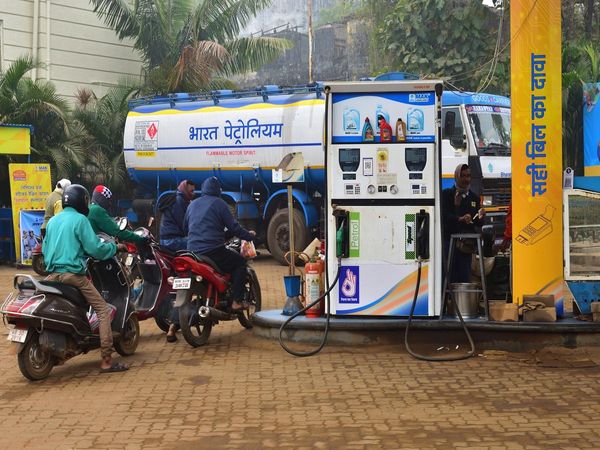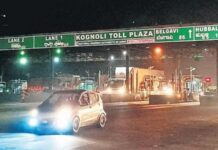Home Articles Petrol price rise swirl gets all in its wake in Karnataka
KEY STORY
-
The governments at the Centre and State may be trying to reason out the rise in prices across the board, but on the ground, it is the common man, who has already been hit by the effects of the Covid-19 pandemic, who is bearing all the brunt.
-
The pandemic forced people inside; private companies, hit by the economic fallout of lockdowns and restrictions, cut jobs and salaries; the education sector and children’s learning abilities took a massive hit; medical expenses became a nightmare; the elders suffered medically and financially; systems were paralysed and the general social frustration levels rose like never before in our lifetimes – not to mention the 38,061 who died from Covid-19 in the state so far, many who were the sole bread-winners of the families.
-
With both petrol and diesel prices going over Rs 100 per litre, people solely dependent on private transport are having to deal with increased expenses, while the cascading effect has pushed up prices of essentials, making daily life more expensive. Besides automotive fuels, the price of liquified petroleum gas (LPG) cylinders has inched closer to the Rs 1,000-mark, affecting home budgets.
-
Many among the middle and upper-middle-class sections, with aspirations influenced by possessions and lifestyle of higher income groups, are struggling with loan repayments amid severe salary cuts, or even job losses. The lower-middle income groups are the worse hit.
IMPACT ON FARMERS
When the effect of price rise is not passed on to customers, it is the producers and service providers who suffer. For instance, Subhash Atiwadkar, a farmer, brings fodder for his cattle and sells vegetables at the Agricultural Produce Market Committee (APMC) in Belagavi, regularly. “We are completely dependent on tractors and two-wheelers to bring green fodder for cattle. The huge jump in fuel prices this year has left us in a lurch. The expenses incurred in rearing and milching cattle is skyrocketing while there is no such rise in the price of milk for the customers (to protect profit margins). Our expenses for transporting vegetables to wholesale markets has increased due to skyrocketing diesel prices. While we fight for fair prices for our produce in the market, if things continue this way, we will be forced to give up farming,” he says.
Karnataka Rajya Raitha Sangha vice-president K Narayana Gowda says fuel price hike is causing additional burden on farmers. For transporting a 15-kg box of vegetables from Hosamattana Halli in Kolar taluk to the APMC, a distance of 15 km, the transportation cost has jumped from Rs 10 Rs 13. Moreover, hiring a tractor costs Rs 4,500-5,000 per acre as against Rs 2,500-3,000 earlier. This is an additional burden on farmers who are already facing losses due to various issues like heavy rains damaging standing crops, he points out.
NO AUTO CORRECT FOR PRICE HIKE
Madikeri-based Santosh Cariappa, a taxi driver, often takes commuters to Bengaluru and parts of Kerala. “The taxi drivers’ association in Kodagu district charges Rs 9 per km and this rate has remained the same over many years. However, with the diesel price crossing Rs 100 per litre, we are unable make any profits. Commuters refuse to pay extra and, if we do not agree to their demands, we will lose out on the little that we were saving,” he says.
He earns about Rs 1,800 for a trip between Madikeri and Bengaluru. “This is after deducting fuel charges and includes the minimum Rs 300 driver tip. We have to spend on our food and other expenses during the travel and are left with a bare minimum after driving such long distances,” he says.
Giridhar (56), an autorickshaw driver from Tanniru Halla Extension in Hassan, rues that passengers often lodge complaints with the traffic police if drivers charge extra fare.
“They have no patience to listen to our problems and insist on the old fares fixed decades ago,” he says, adding that he is the sole earning member of his family, and the entire family’s expenses including house rent, domestic gas, electricity bills, groceries, vegetables, children’s school fees and festival expenses have to be borne by him.
Coming down heavily on successive governments for often increasing prices of essential commodities, including fuel, Devaraj, a mason, says special packages should be announced for poor families and those in the unorganised sectors as they cannot save from earnings for emergencies, including health. “We dream of buying new clothes, a motorcycle and electronic gadgets till the end of our lives. Increasing fuel prices leads to increase in prices of essential commodities, diminishing whatever savings we have,” he says.
A HARD LIFE
Probably the worst affected are those who are completely powerless in the face of price hikes – like Rajesh S, a parking attendant on MG Road in the heart of Bengaluru. With vehicle parking fees streamlined with automated systems brought in, people like him have to survive on what they get while having to contend with a heap of problems back home. He is increasingly burdened with the cost of cooking gas going up even as his physically challenged mother requires constant medication.
“Getting rations is very difficult for us with high food prices. Everything has become expensive in Bengaluru. Due to lack of employment options, I can’t get a better job. Rain or shine, I have to stay here and take care of customers, but they don’t bother about people like us.”
Amol Kademani, who sells vada-pav at a roadside mobile food stall in Belagavi, says, “The increasing price of LPG and petrol/diesel is very disturbing. I sold vada-pav for Rs 10 a piece three months ago. I was forced to increase the price to Rs 15 as I am unable to match the expenses incurred on cooking. Now, I have decided to increase the price to Rs 20 as I am unable to tackle the increasing prices of LPG, cooking oil and transporting my mobile food stall,” he says.
Akshay, a food delivery agent in Bengaluru, says, “I work about 15 hours a day riding around the city on my bike. Our company gives us fuel allowance of Rs 250 a day; but every day, I have to dip into my own salary and shell out an extra Rs 100, thanks to the rising petrol price. For a full tank of fuel, it costs over Rs 500, so I don’t even get enough to ensure a full-tank. My company refuses to raise the petrol allowance, so now I’m struggling because even at home, the price of food and water has gone up.”
Jenson V P, a retired travel manager, says, “In my experience of working with people from different backgrounds, I notice the middle and lower income people struggling a lot due to price hikes. Some are pushed to the brink of suicide because they can’t support their families anymore and feel ashamed. Upper class people are able to cope, but we don’t think about the people starving.”
INDUSTRIALISTS HIT TOO
Ramesh Hegde, chairman of Machenahalli Industrial Area, says, “We industrialists are compromising on our profit margins. Micro and small industrialists, whose monthly turnover is less than Rs 5 lakh, are losing more as they have to compromise on profit margins. Neither the raw material supplier nor the end user will take the responsibility”.
He points out that when most of the industrialists announced bonuses for their staff for Dasara, the workers demanded an increase in allowance instead of bonus. This shows how much they have been impacted by price hike.

(With inputs from Ramu Patil & Donna Eva in Bengaluru; Prajna G R in Madikeri; Sunil Patil in Belagavi; Udaya Kumar BR in Hassan & Ramachandra V Gunari in Shivamogga)















